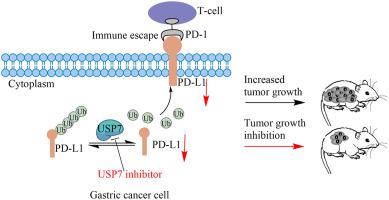Acta Pharmaceutica Sinica B ( IF 14.5 ) Pub Date : 2020-11-16 , DOI: 10.1016/j.apsb.2020.11.005 Zhiru Wang , Wenting Kang , Ouwen Li , Fengyu Qi , Junwei Wang , Yinghua You , Pengxing He , Zhenhe Suo , Yichao Zheng , Hongmin Liu

|
Targeting immune checkpoints such as programmed cell death protein 1 (PD-1) and programmed death ligand-1 (PD-L1) have been approved for treating melanoma, gastric cancer (GC) and bladder cancer with clinical benefit. Nevertheless, many patients failed to respond to anti-PD-1/PD-L1 treatment, so it is necessary to seek an alternative strategy for traditional PD-1/PD-L1 targeting immunotherapy. Here with the data from The Cancer Genome Atlas (TCGA) and our in-house tissue library, PD-L1 expression was found to be positively correlated with the expression of ubiquitin-specific processing protease 7 (USP7) in GC. Furthermore, USP7 directly interacted with PD-L1 in order to stabilize it, while abrogation of USP7 attenuated PD-L1/PD-1 interaction and sensitized cancer cells to T cell killing in vitro and in vivo. Besides, USP7 inhibitor suppressed GC cells proliferation by stabilizing P53 in vitro and in vivo. Collectively, our findings indicate that in addition to inhibiting cancer cells proliferation, USP7 inhibitor can also downregulate PD-L1 expression to enhance anti-tumor immune response simultaneously. Hence, these data posit USP7 inhibitor as an anti-proliferation agent as well as a novel therapeutic agent in PD-L1/PD-1 blockade strategy that can promote the immune response of the tumor.
中文翻译:

放弃USP7是一种下调PD-L1并使胃癌细胞对T细胞杀伤敏感的替代策略
靶向免疫检查点(例如程序性细胞死亡蛋白1(PD-1)和程序性死亡配体-1(PD-L1))已被批准用于临床治疗黑素瘤,胃癌(GC)和膀胱癌。然而,许多患者对抗PD-1 / PD-L1治疗无效,因此有必要针对传统的PD-1 / PD-L1靶向免疫疗法寻求替代策略。根据癌症基因组图谱(TCGA)和我们内部组织库的数据,发现PD-L1表达与GC中泛素特异性加工蛋白酶7(USP7)的表达呈正相关。此外,USP7直接与PD-L1相互作用以使其稳定,而废除USP7则减弱了PD-L1 / PD-1的相互作用,并使癌细胞对T细胞在体外和体外的杀伤敏感。体内。此外,USP7抑制剂通过稳定P53抑制GC细胞增殖在体外和体内。总的来说,我们的发现表明,除了抑制癌细胞的增殖外,USP7抑制剂还可以下调PD-L1的表达以同时增强抗肿瘤免疫反应。因此,这些数据表明USP7抑制剂是PD-L1 / PD-1阻断策略中的一种抗增殖剂以及新型治疗剂,可以促进肿瘤的免疫反应。



























 京公网安备 11010802027423号
京公网安备 11010802027423号